Romania Investment Marketbeat H2 2025
Bucharest, October 2021: Romanian employees who had to work more from home in the last 18 months due to the COVID-19 pandemic want to return to the office, given that more than half of them associate coming back to the office with “the return to normality” and experience a lack of socializing with their colleagues, according to the “Back to the Office” study conducted by Cushman & Wakefield Echinox.
The study was conducted in Bucharest and in the main regional cities, covering employees from more than 10 industries, including IT, finance, production, professional or public services. The report is based on a survey carried out in July on a sample of almost 500 responses. The data was collected by MKOR Consulting, an independent research company.
 According to the survey, the first half of the year had already marked the return to the office of a larger number of employees throughout Romania, therefore 43% of the respondents stated that they worked mainly from the office, compared to 36% between May and December 2020, and 29% during March-May 2020 (the lockdown period) respectively.
According to the survey, the first half of the year had already marked the return to the office of a larger number of employees throughout Romania, therefore 43% of the respondents stated that they worked mainly from the office, compared to 36% between May and December 2020, and 29% during March-May 2020 (the lockdown period) respectively.
Mădălina Cojocaru, Partner, Office Agency, Cushman & Wakefield Echinox: “The opening of schools and kindergartens has encouraged more employees to return to the office, especially among those over 30 who, when their children were learning online, couldn’t come to the office even if they wanted to. Moreover, young people up to 27 years old preferred to go to the office in the absence of a proper workspace at home.”
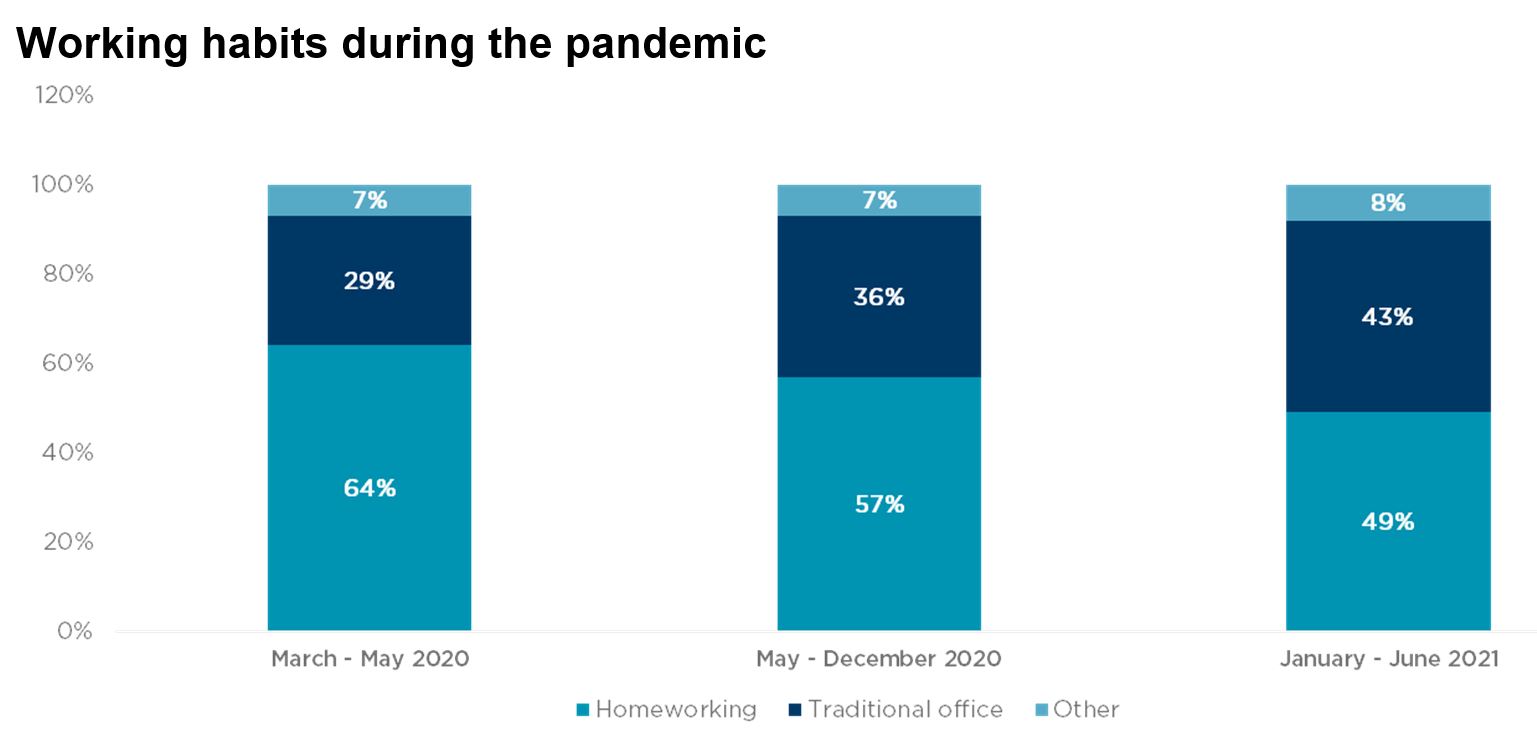
The need to go to the office remains high, given that, when asked if they could choose where to work from, only 10% of the employees said they want to work exclusively from home. The importance of the office is even more pronounced in Bucharest, where 96% of the respondents want to work at least one day per week from the office, compared to the regional cities, where the share is of 87%.
Thus, over a quarter of those interviewed would like to work 3 days from the office and 2 days from home, while 17% want to work only from the office. Choosing a certain work model is based, on one hand, on the benefits of working from home – the most important being saving time and money, and on the other hand on the disadvantages caused by the absence from the office space, the employees pointing in particular to the need for socialization and the difficulties of separating working time from personallife.
Thus, 83% of the respondents appreciated the fact that they did not waste any more time in traffic as the main advantage of working from home, while 78% felt a lack of socializing with colleagues caused by this way of working. The commuting time is a problem both for the employees living in Bucharest (73% being satisfied that they no longer waste time in traffic), and also for those living in the main regional cities, where the corresponding share is of 61%. The lack of socializing is more acute in Bucharest, than in the regional cities, 82% versus 77% respectively.
Other benefits of working from home are saving money (53% of responses), improved work-life balance (39%), more freedom to manage working hours (35%) or more time for rest (34%) .
When it comes to other minuses of working from home, the difficulty in separating the professional life from the personal time is on the second place, with 50% of the answers, while the lack of a proper space to work was indicated by 32% of the respondents. Apart from these, more disadvantages noticed are a diminished capacity to focus and the difficulties in managing the relations with clients, partners and collaborators, each in 21% of cases.
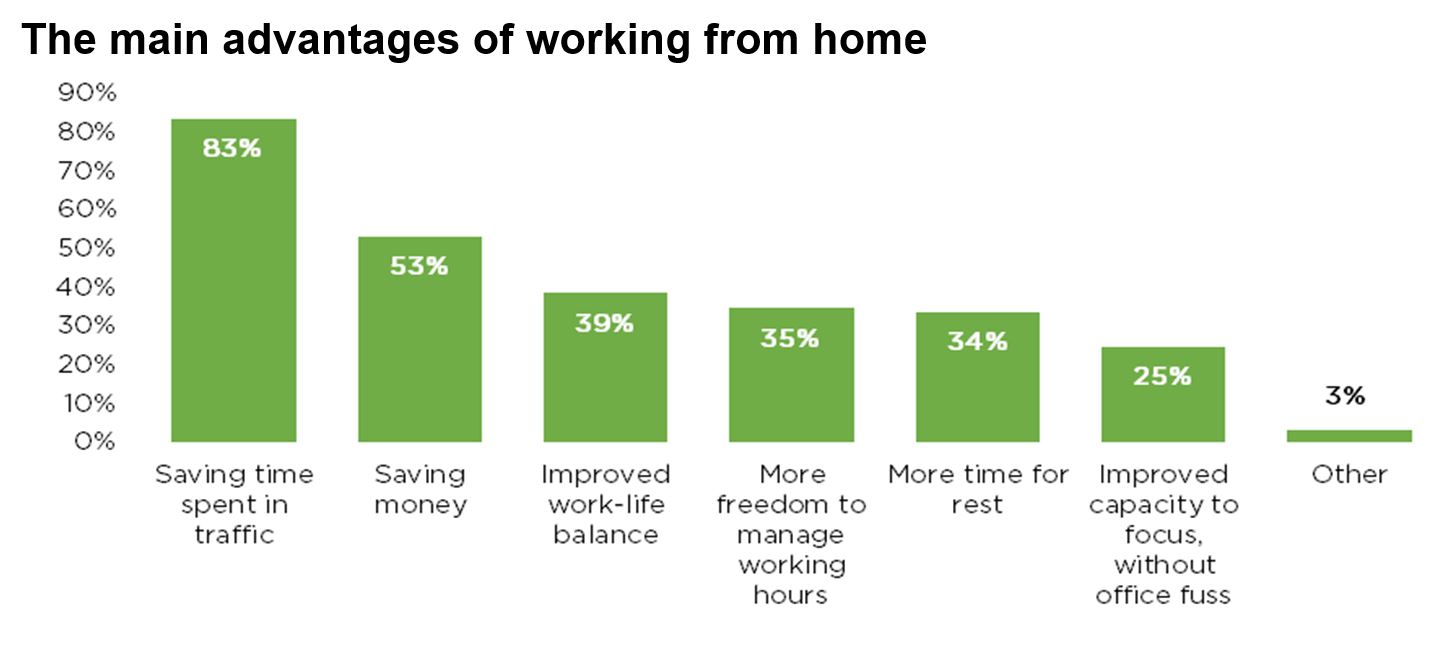
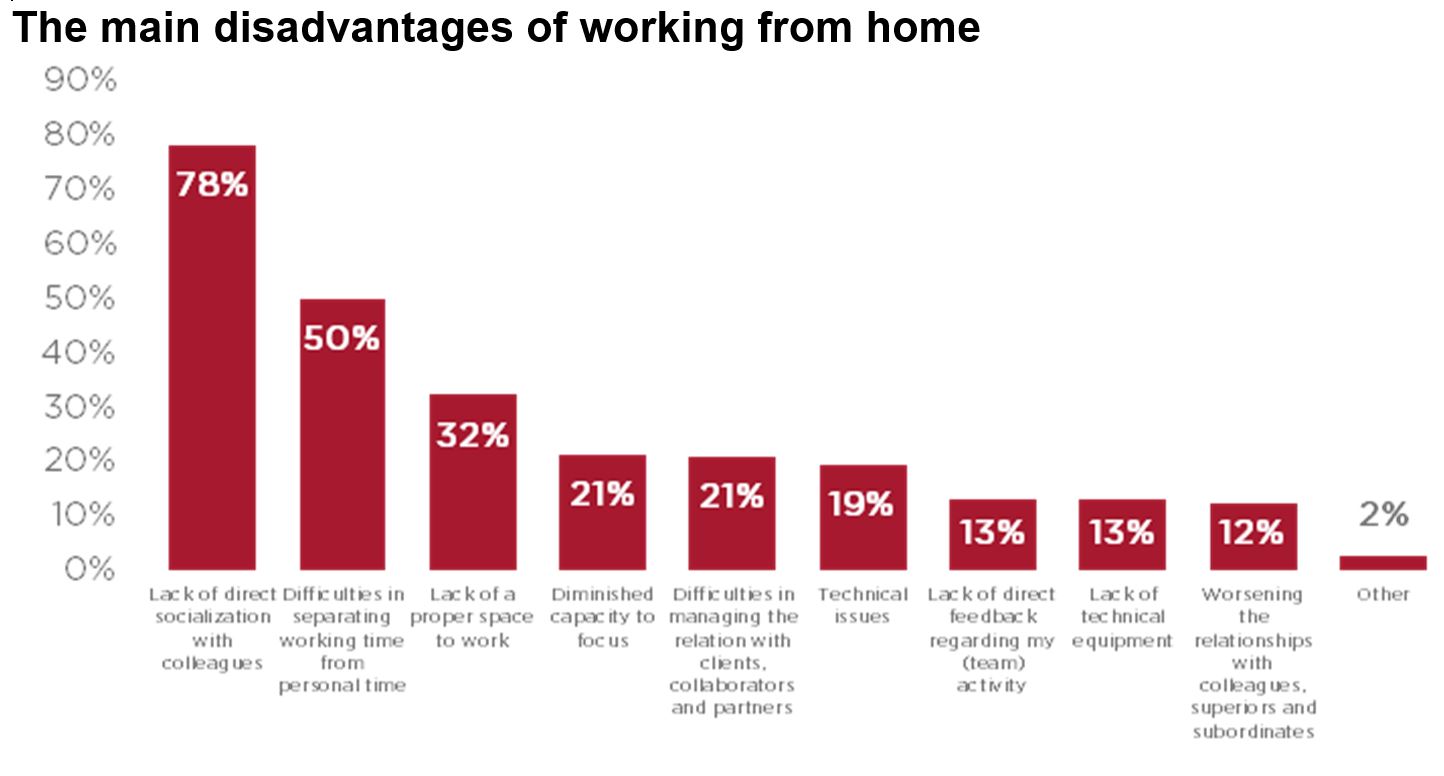
Coming back to the office is primarily associated with an improved communication with colleagues (63% of respondents), this being the main advantage of returning to the office, while a significant percentage of employees (51%) consider it as a “return to normality”.
Also, feeling of being part of a group and having a well-defined working time are other advantages of coming back to the office.
Commuting time (65%), more expenses (50%) and less working flexibility (50%), but also the risk of COVID-19 infection (37%) are considered the disadvantages of returning to the office. An important aspect pertains to the differences regarding the fear of a Covid-19 infection felt by the employees working from Bucharest and those from the regional cities. Thus, the Covid-19 risk infection in the office is perceived as a major threat by 42% of the respondents from the regional cities, compared with only 27% in Bucharest.
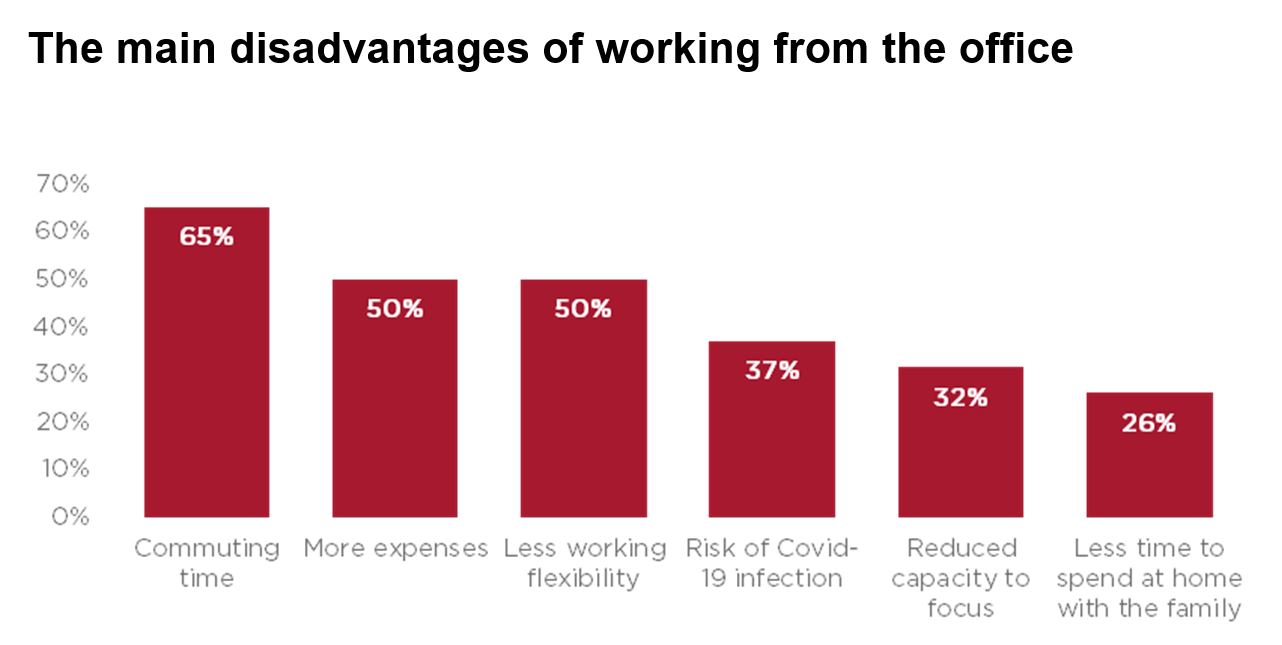
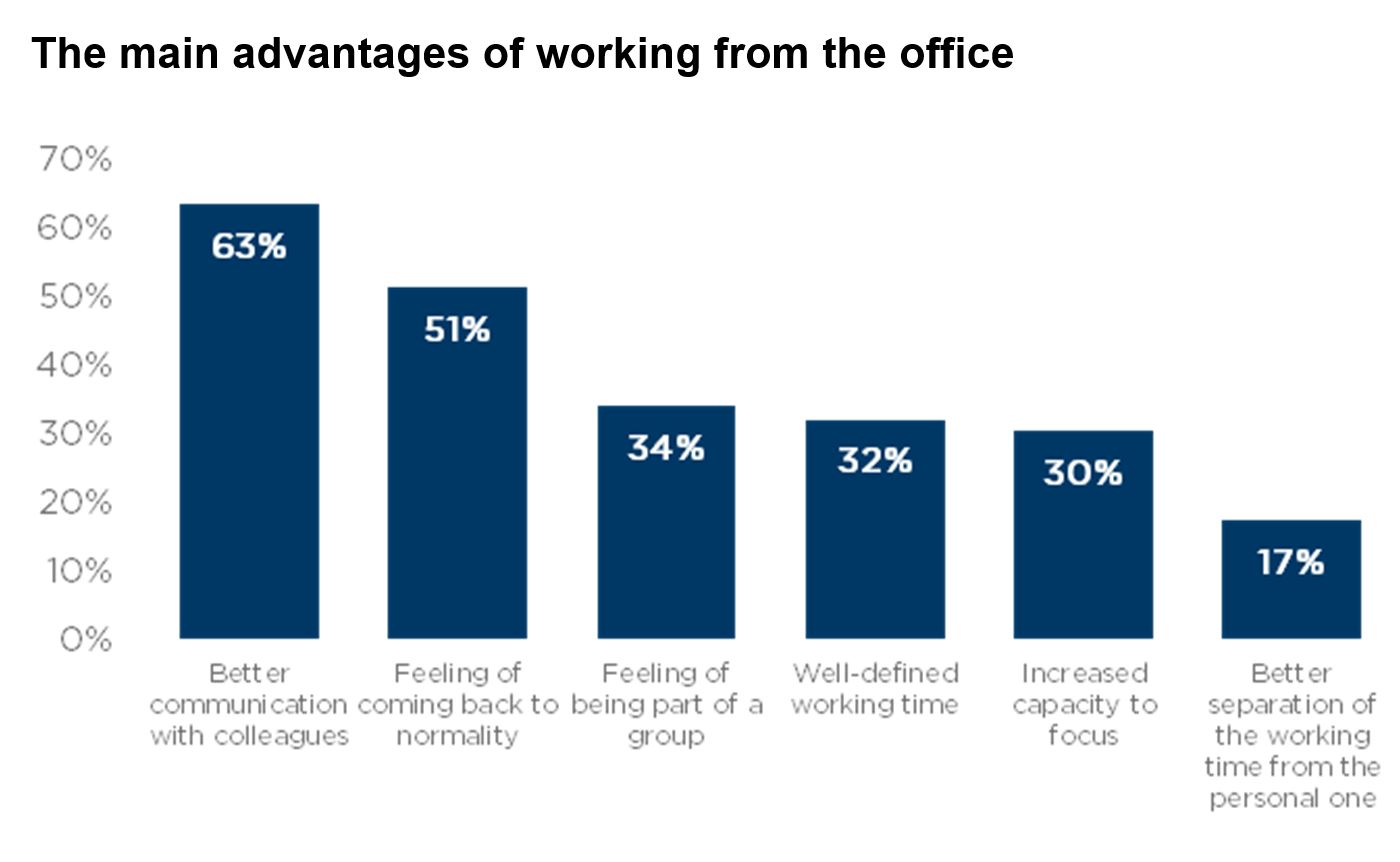
The Romanian employees easily adapt to both working from home and from the office
The evaluation of both working from home or from the office experiences shows an agility of the Romanian employees, given that most of them felt good and very good under both circumstances. Thus, 95% of the respondents stated that they worked well and very well from home, while 86% declared that working from the office was good and very good.
The objective of this survey was to determine how the employees’ mindset has changed (or not) after 18 pandemic months in regards to working from home or from the office and how they perceive both alternatives, once the medical situation will fully stabilize and companies will have to make clear decisions pertaining to their office footprint.
Vlad Săftoiu, Research Analyst, Cushman & Wakefield Echinox: “Although there is more interest among employees to return to the office, even in a hybrid model, it is still difficult to predict the extent to which the offices will be occupied after the pandemic. Therefore, it is important to mention that a ”one size fits all” approach is not applicable in this case, as companies and employees have different strategies and needs.”
 Romania is in line with the global trend Globally, in September 2021, about 40% of the employees were working from the office, according to Cushman & Wakefield “Return to the office” report, therefore Romania is in line with the global trend. China ranks first, with over 90% of employees returning to office spaces, while the office presence in the other analyzed regions varies between 27% and 40%.
Romania is in line with the global trend Globally, in September 2021, about 40% of the employees were working from the office, according to Cushman & Wakefield “Return to the office” report, therefore Romania is in line with the global trend. China ranks first, with over 90% of employees returning to office spaces, while the office presence in the other analyzed regions varies between 27% and 40%.
In Europe, 40% of the employees were working from the office in September, with Prague being the region’s top country, with approximately 80% of employees, the Czech Republic’s capital being followed by Hamburg (60%) and Warsaw (45%). Returning to the office in these cities is directly linked to the high vaccination rate and low infection rates.
Cushman & Wakefield Echinox is a top real estate consulting company on the local market and the exclusive affiliate of Cushman & Wakefield in Romania, owned and operated independently. The team of over 80 professionals and collaborators offers a full range of services to investors, developers, landlords and tenants. For more information, visit www.cwechinox.com
Cushman & Wakefield, one of the global leaders in commercial real estate services, with 50,000 employees in over 60 countries and € 7.8 billion in revenue, provides asset and investment management consulting services, capital markets, leasing, properties administration, tenant representation, project management, design and evaluation services. For more information, visit www.cwechinox.com





